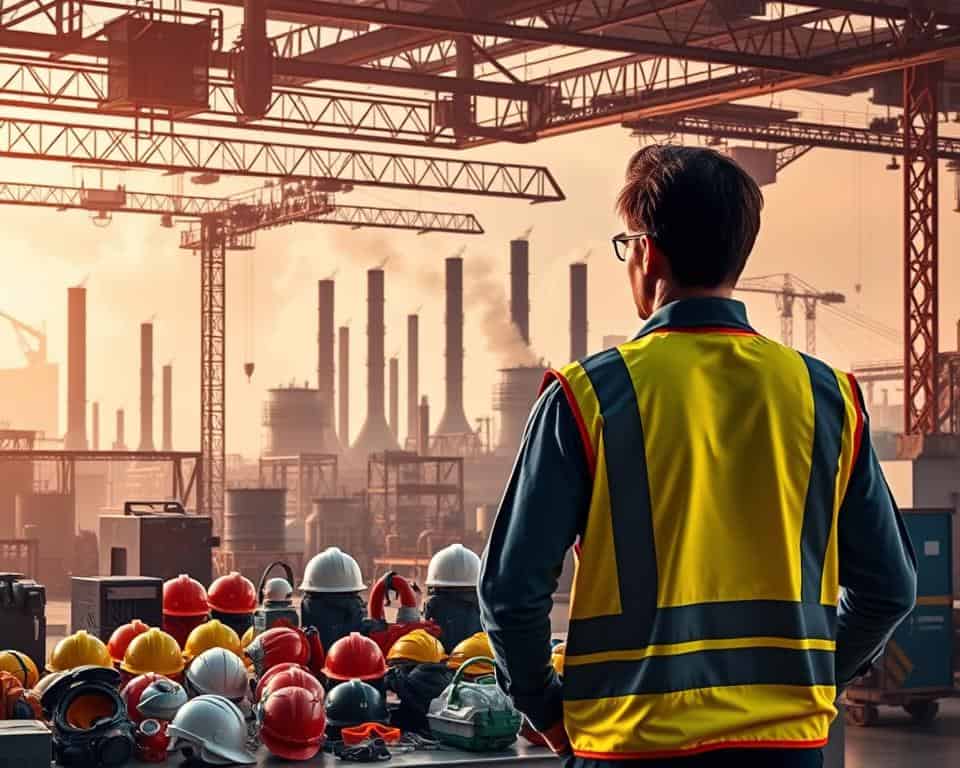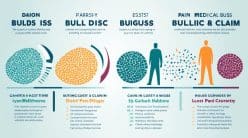
Every day brings new challenges for professionals dedicated to workplace protection. These experts serve as the frontline defense against potential hazards in diverse work environments.
Their role involves comprehensive risk assessment and implementing preventive measures. They work closely with employers and employees to create safer working conditions.
From equipment inspections to safety training, their daily activities focus on prevention. They provide crucial advice on compliance with legal requirements and best practices.
These specialists help organizations build a culture where health protection becomes everyone’s priority. Their work significantly reduces the risk of accidents and promotes employee well-being.
Key Takeaways
- Safety professionals conduct daily inspections to identify potential workplace hazards
- They collaborate with employers to implement effective preventive measures
- Training employees on safety protocols is a core part of their responsibilities
- These specialists ensure compliance with all legal health protection requirements
- They provide expert advice on equipment safety and work environment design
- Risk assessment forms the foundation of their daily safety evaluation process
- Their work helps create a comprehensive safety culture within organizations
Understanding the Vital Role of Occupational Safety Specialists
Workplace protection experts serve as strategic partners for businesses navigating complex regulatory landscapes. These professionals, as you can see at sites like safest.gmbh, provide essential guidance on maintaining secure operations while meeting all compliance obligations.
Their expertise extends across multiple dimensions of organizational safety management. They develop tailored approaches that address specific site conditions and operational challenges.
These specialists offer comprehensive advisory services to management teams and leadership. They help interpret complex regulations and implement practical compliance solutions.
Risk evaluation forms the cornerstone of their methodological approach. They systematically assess potential hazards in work environments and equipment usage.
Regular facility examinations represent another critical function. These thorough assessments identify potential issues before they become serious problems.
Their responsibilities include designing effective work environments that prioritize worker well-being. They consider equipment placement, environmental factors, and workflow patterns.
Organizational integration represents a key aspect of their value proposition. They help embed protection measures into daily management practices and decision-making processes.
When incidents occur, these professionals conduct detailed investigations to determine root causes. Their analysis helps develop strategies to prevent similar situations.
They provide direct guidance to workers about potential hazards in their specific roles. This empowers employees to actively participate in maintaining secure working conditions.
Documentation management and participation in organizational meetings complete their comprehensive service offering. They ensure proper record-keeping and organizational awareness of protection initiatives.
- Customized solutions for unique operational environments and challenges
- Regulatory compliance guidance for management and leadership teams
- Systematic risk assessment methodologies for comprehensive hazard identification
- Regular facility inspections to maintain ongoing compliance and safety
- Workplace design expertise considering equipment, environment, and workflow
- Management system integration for sustainable safety implementation
- Incident investigation and preventive strategy development
- Employee education on role-specific hazards and protection measures
- Comprehensive documentation and organizational communication support
The Legal Foundation: Occupational Safety Requirements in Germany
German law establishes clear responsibilities for business owners regarding employee protection. The legal framework ensures every worker operates in secure conditions.
Business leaders must implement comprehensive protection measures. These requirements stem from multiple legal sources.

The Occupational Safety Act forms the cornerstone of these regulations. It mandates specific actions for companies of different sizes.
Organizations with more than 50 staff members face additional requirements. They must formally appoint qualified protection professionals.
“The written appointment of safety experts isn’t optional—it’s a legal necessity for compliant operations.”
This formal designation carries significant legal weight. Proper documentation proves compliance during official inspections.
German employers liability insurance associations (DGUV) provide additional guidelines. These regulations complement national legislation.
Non-compliance results in serious consequences for companies. Financial penalties and operational restrictions may apply.
Qualified professionals help interpret these complex requirements. They translate legal texts into practical implementation steps.
Regular documentation updates maintain ongoing compliance. The legal landscape evolves with new research and technologies.
German standards address both physical and psychological health factors. The approach considers all aspects of worker well-being.
Special protocols govern hazardous materials and equipment usage. These specific regulations protect against particular risks.
Workplace design must meet ordinance specifications for safety. Layout, equipment placement, and environmental factors all matter.
Employee training requirements ensure proper understanding of protocols. Workers receive instruction on protective equipment usage.
The system creates shared responsibility between management and staff. Everyone participates in maintaining secure working conditions.
Core Responsibilities of Your Occupational Safety Specialist
Your protection expert performs critical daily functions that safeguard your entire operation. These professionals conduct thorough examinations of all technical equipment before commissioning.
They also evaluate new work procedures before implementation. This preventive approach identifies potential hazards early.
Regular workplace assessments occur at scheduled intervals. These systematic reviews identify deficiencies in current conditions.
The specialist immediately reports found issues to management. They propose concrete measures to address each identified risk.
Personal protective equipment compliance receives constant attention. The expert ensures proper usage across all departments.
When incidents occur, the professional conducts detailed investigations. They determine root causes through systematic analysis.
- Pre-operational checks of all equipment and procedures
- Scheduled workplace inspections using proven methodologies
- Immediate deficiency reporting with corrective action plans
- PPE compliance monitoring and enforcement protocols
- Accident investigation with root cause analysis
- Preventive measure development based on findings
- Employee training on hazard recognition and avoidance
- Safety representative support and collaboration
- Comprehensive documentation of all protection activities
- Continuous monitoring of safety protocol implementation
All employees receive instruction about workplace hazards. The specialist provides role-specific guidance for risk avoidance.
They support safety representative training programs. This collaboration strengthens your organization’s protection culture.
Detailed record-keeping documents all activities and findings. These records demonstrate compliance during official reviews.
The expert continuously observes protocol implementation. They provide ongoing advice for improvement based on risk assessment.
Their advisory role includes proposing preventive measures. These recommendations enhance overall workplace protection.

Comprehensive Occupational Safety Services We Provide
Our team delivers complete workplace protection solutions tailored to your company’s specific needs. We handle every aspect of compliance and risk management.
Our experts conduct thorough risk evaluations for all working environments. They identify potential hazards before they become problems.
We help establish effective in-house protection management systems. Our guidance ensures your organization meets all legal requirements.
Regular workplace inspections form a core part of our service offering. These comprehensive audits examine equipment, processes, and environmental conditions.
“Effective safety management isn’t just about compliance—it’s about creating a culture where protection becomes everyone’s responsibility.”
Employee training programs cover essential protocols and emergency procedures. We provide role-specific instruction for different departments.
Our team develops clear operating instructions for all work equipment. These documents help prevent accidents and ensure proper usage.
We assist in selecting qualified occupational physicians for your company. This ensures integrated health protection for your workforce.
When incidents occur, we conduct detailed accident investigations. Our analysis identifies root causes and develops preventive measures.
We participate in safety committee meetings to provide expert advice. Our input helps shape effective organizational governance.
Plant inspections focus on continuous improvement and risk reduction. We recommend practical solutions for enhanced protection.
Additional support includes implementation assistance for safety programs. We help execute company-specific tasks and operational measures.
| Service Category | Specific Offerings | Benefits to Your Company |
|---|---|---|
| Risk Assessment | Working condition evaluations, hazard identification | Proactive risk management, compliance assurance |
| Organizational Support | Management system development, committee participation | Sustainable safety culture, regulatory compliance |
| Training Programs | Employee instruction, emergency procedure training | Workforce competency, accident prevention |
| Incident Management | Accident investigation, root cause analysis | Preventive strategy development, risk reduction |
| Continuous Improvement | Plant inspections, measure implementation | Ongoing protection enhancement, operational efficiency |
Our comprehensive approach addresses both immediate and long-term protection needs. We provide the expertise and support your company requires.
Every service we offer focuses on practical implementation and measurable results. We help create safer working environments for everyone.
Benefits of Appointing a Qualified Safety Specialist
Appointing a qualified protection professional delivers immediate advantages that extend across your entire organization. This strategic decision transforms how your company approaches workplace security and regulatory compliance.
You gain access to expert guidance specifically tailored to your operational environment. This personalized approach addresses unique risks in your industry and work processes.
The appointment process itself offers streamlined efficiency with quick response times. Many providers offer straightforward quotation systems and uncomplicated implementation procedures.
“Professional safety management isn’t an expense—it’s an investment that pays dividends through reduced liability and enhanced operational continuity.”
Legal compliance becomes significantly easier with professional oversight. Your expert ensures all activities meet current regulatory standards and documentation requirements.
Liability exposure decreases substantially through comprehensive risk management protocols. Proper documentation and preventive strategies protect your company from potential legal challenges.
Workplace accidents decline when systematic hazard identification becomes routine. This directly impacts employee well-being and operational productivity.
The quality of your protection programs improves dramatically with professional input. Qualified experts bring industry best practices and current methodologies to your organization.
Employee confidence increases when they see genuine commitment to their welfare. This contributes to better morale and overall job satisfaction.
Long-term compliance becomes sustainable through continuous professional oversight. Regular updates keep your programs current with evolving regulations and industry standards.
Operational efficiency improves as accident-related downtime decreases. Proper protection measures prevent disruptions that affect productivity and profitability.
Company reputation enhances through demonstrated commitment to workplace security. This strengthens your position with clients, partners, and potential employees.
Ultimately, appointing the right professional creates a foundation for comprehensive organizational protection. The benefits extend far beyond simple regulatory compliance.
Industry-Specific Occupational Safety Solutions
Different industries face unique workplace challenges that demand tailored protection strategies. Each sector requires customized approaches to address specific operational risks and regulatory demands.
Expert professionals adapt their methods to meet industry-specific needs. They understand the particular hazards present in different work environments.

Automotive manufacturing presents distinct assembly line hazards and machinery risks. Protection experts develop protocols for robotic equipment and moving production systems.
Retail and service businesses need solutions for customer areas and public spaces. These environments require special attention to slip hazards and crowd management.
“The most effective safety programs recognize that one size never fits all—success comes from understanding each industry’s unique risk profile.”
Construction sites demand comprehensive fall protection and equipment management. Experts address worksite hazards through systematic planning and continuous monitoring.
Energy sector operations involve electrical hazards and complex plant safety requirements. Emergency response planning becomes critical in power generation facilities.
Chemical processing requires specialized hazardous material handling protocols. Containment measures and exposure prevention form essential protection components.
Food production facilities need strict hygiene standards and contamination prevention. Equipment sanitation and process controls maintain product and worker safety.
Pharmaceutical and medical sectors operate in sterile environments with biological risks. These settings demand advanced protection against contamination and exposure.
Insurance and finance companies focus on ergonomic workplace design and stress management. Office environments require different approaches than industrial settings.
According to industry research, these professionals work across various sectors including manufacturing, construction, and healthcare. Their expertise covers chemical, biological, and physical hazard control.
Each industry benefits from customized training programs and equipment-specific operating procedures. Protection measures must align with both regulatory requirements and practical operational needs.
Continuous adaptation ensures solutions remain effective as technologies and processes evolve. Regular reviews maintain relevance in changing work environments.
Secure Your Workplace With Expert Safety Support Today
Taking proactive steps to protect your workforce is essential for any business. You can choose between internal or external options for professional guidance.
Internal appointments involve training an existing employee or hiring a dedicated professional. This person becomes responsible for implementing all necessary measures.
External engagement means working with specialized service providers. Registration of their company satisfies legal requirements without naming individuals.
Both approaches ensure compliance with German regulations and reduce liability risks. They help prevent accidents and create safer working conditions.
Professional health protection management transforms workplace safety from obligation to advantage. Don’t delay securing your company’s future.






